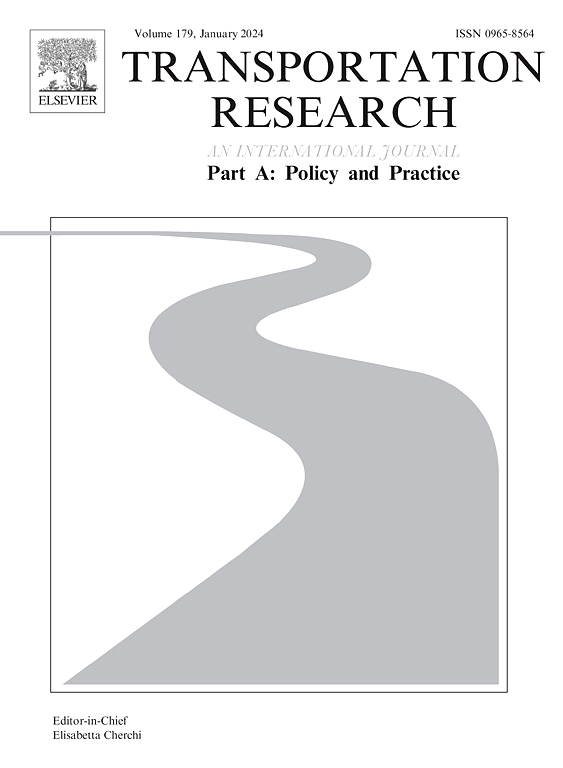用面板数据模拟惯性和冲击效应:在圣地亚哥模式选择中的应用
IF 6.8
1区 工程技术
Q1 ECONOMICS
Transportation Research Part A-Policy and Practice
Pub Date : 2025-07-10
DOI:10.1016/j.tra.2025.104593
引用次数: 0
摘要
模式选择的过程,特别是在通勤旅行的情况下,反映了人们在面对连续的众所周知的决定时,必须简化他们的选择评估的强烈倾向。因此,随着时间的推移,重复包含潜在重要惯性元素的“习惯性”选择是可以预期的。然而,虽然惯性效应增加了在稳定情况下保持相同选择的可能性,但在被激进或重大政策干预所破坏的不断变化的环境中,用户行为可能受到对突然变化的特定反应的影响。这种冲击效应可能会增加人们放弃习惯性选择的可能性。由于大多数需求模型依赖于横截面数据,因此在实际研究中对这种时间效应的处理没有得到足够的重视。一些研究试图纳入惯性效应,但没有一个同时包括惯性和冲击效应。在这里,我们使用圣地亚哥小组的数据,这是一个著名的模式选择显示偏好小组,围绕智利圣地亚哥联合城市引入激进的新政策而建立。我们的目标是整合选择过程中涉及的三种力量的影响:(1)模态属性的相对值,(2)惯性效应,以及(3)突然政策干预造成的冲击。我们提出了一个惯性冲击模型的公式及其在模拟和实际数据中的应用(根据模型估计期间未使用的新数据验证模型)。我们的结果证实,在模拟变化的系统时,需要充分考虑这种时间效应。否则,可能会出现严重的模型估计错误。本文章由计算机程序翻译,如有差异,请以英文原文为准。
Modelling inertia and shock effects with panel data: An application to mode choice in Santiago
The mode choice process, especially in the case of commuter trips, reflects the strong tendency people have to simplify the assessment of their options when confronted with successive well-known decisions. Thus, repeating a “habitual” choice involving a potentially important inertia element over time is expected. However, while inertia effects increase the probability of maintaining the same choice in a stable situation, in a changing environment disrupted by a radical or significant policy intervention, user behaviour may be affected by a specific response to abrupt changes. Shock effects of this kind could increase the probability of individuals leaving their habitual choices.
The handling of such temporal effects has not received enough attention in practical studies, as most demand models rely on cross-sectional data. A few studies have attempted to incorporate inertia effects, but none include both inertia and shock effects. Here, we use data from the Santiago Panel, a well-known mode choice revealed preference panel built around the introduction of a radical new policy for the conurbation of Santiago de Chile. We aimed to incorporate the effects of three forces involved in the choice process: (1) the relative values of the modal attributes, (2) the inertia effect, and (3) the shock resulting from an abrupt policy intervention. We present the formulation of an inertia-shock model and its application to simulated and actual data (validating the models against new data not used during model estimation). Our results confirm the need to adequately consider such temporal effects when modelling changing systems. Otherwise, severe errors in model estimation may arise.
求助全文
通过发布文献求助,成功后即可免费获取论文全文。
去求助
来源期刊
CiteScore
13.20
自引率
7.80%
发文量
257
审稿时长
9.8 months
期刊介绍:
Transportation Research: Part A contains papers of general interest in all passenger and freight transportation modes: policy analysis, formulation and evaluation; planning; interaction with the political, socioeconomic and physical environment; design, management and evaluation of transportation systems. Topics are approached from any discipline or perspective: economics, engineering, sociology, psychology, etc. Case studies, survey and expository papers are included, as are articles which contribute to unification of the field, or to an understanding of the comparative aspects of different systems. Papers which assess the scope for technological innovation within a social or political framework are also published. The journal is international, and places equal emphasis on the problems of industrialized and non-industrialized regions.
Part A''s aims and scope are complementary to Transportation Research Part B: Methodological, Part C: Emerging Technologies and Part D: Transport and Environment. Part E: Logistics and Transportation Review. Part F: Traffic Psychology and Behaviour. The complete set forms the most cohesive and comprehensive reference of current research in transportation science.

 求助内容:
求助内容: 应助结果提醒方式:
应助结果提醒方式:


